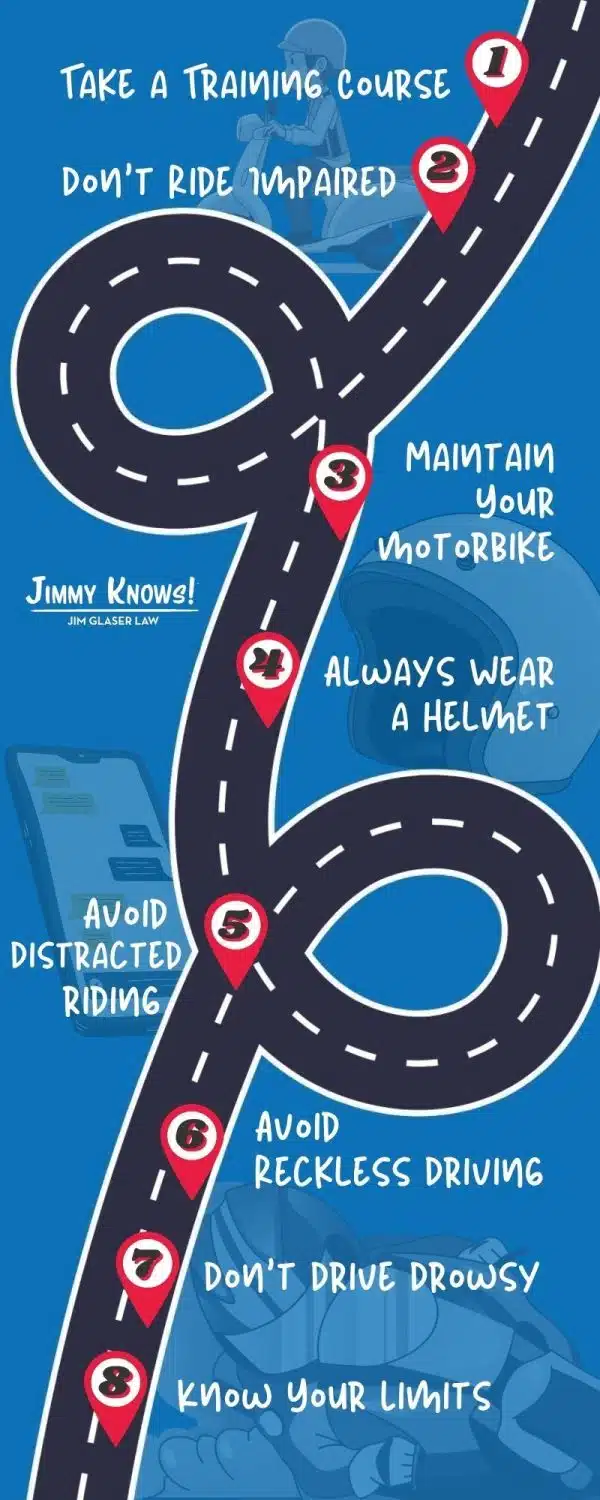
The Short Answer:
If you’re hit on a motorcycle, move out of traffic if you can do so without further injury, keep your protective gear on, and call 911 right away. Seek medical attention even if you feel fine. Many injuries don’t show up immediately. Document everything, exchange contact and insurance information, and avoid admitting fault. Then, contact a motorcycle accident attorney to help protect your legal rights and pursue the compensation you may be owed.
Key Takeaways
- Move to a safe location, but don’t leave the scene. Prioritize your safety by getting out of traffic, but remain at the scene until help arrives. Keep your helmet and gear on until medical professionals evaluate you.
- Call 911 and report all injuries, even minor ones. Adrenaline may mask pain, so report every symptom to emergency responders. Having a police report on record can also support your insurance or legal claim later.
- Document everything at the scene. Take clear photos of your injuries, vehicle damage, road conditions, and anything else that could be useful. Exchange contact and insurance information with the other driver, and ask any witnesses for their names and phone numbers in case they’re needed later.
- Do not admit fault or apologize. Even casual remarks like “I didn’t see you” or “I’m sorry” can be twisted into admissions of guilt. It’s best to stick to the facts when speaking with anyone at the scene.
- Be careful when contacting your insurance company. Report the accident promptly, but avoid giving detailed statements until you’ve spoken with a lawyer. Insurers may try to get you to settle for less than you may deserve.
- Contact Jim Glaser Law for legal guidance. The team at Jim Glaser Law can help protect your rights and pursue the compensation you may be owed.
Table of Contents
- 1. Move to a Safe Area, But Don’t Leave the Scene
- 2. Leave Your Gear On Until You’re Checked by a Medical Professional
- 3. Call 911 and Seek Medical Attention
- 4. Document the Scene With Photos and Videos
- 5. Exchange Information With Other Parties
- 6. Collect Witness Information
- 7. Don’t Apologize or Admit Fault
- 8. Notify Your Insurance Company
- 9. Be Careful With Statements to Insurance Adjusters
- 10. Track Your Medical Treatment and Recovery
- 11. Get Legal Advice From Jim Glaser Law
- How to Prevent Motorcycle Accidents
- Why You Need an Attorney After a Motorcycle Accident
1. Move to a Safe Area, But Don’t Leave the Scene
If you’ve been hit on your motorcycle, your safety comes first. If you’re able, move yourself and your bike out of traffic to avoid further injury. Do not leave the scene entirely. Doing so could lead to legal trouble, especially if injuries or property damage occurred.
While waiting for help, stay visible and alert. Turn on hazard lights if possible and try to remain calm. Staying put and staying safe ensures that first responders can help you quickly and that your side of the story is heard.
2. Leave Your Gear On Until You’re Checked by a Medical Professional
After a motorcycle accident, you might instinctively want to remove your helmet or riding gear, especially if you’re shaken or feel sore. But doing so could make things worse. Helmets and protective clothing may be stabilizing injuries you don’t even realize you have.
Removing your gear too soon can worsen head, neck, or spine injuries. Stay in place and wait for emergency responders to assess your condition. They’re trained to remove your equipment safely, without putting you at further risk.
3. Call 911 and Seek Medical Attention
Even if you think you’re okay, call 911 after a motorcycle accident. Emergency services can dispatch help quickly and ensure a proper medical evaluation at the scene.
When requesting an ambulance, stay calm and clearly state your location, the number of people involved, and whether anyone is unconscious, bleeding, or in severe pain. If you’re unsure about your injuries, say so. It’s better to be cautious.
Some injuries, like internal bleeding or concussions, may not show symptoms right away. Always err on the side of safety and get checked by medical professionals as soon as possible.
Always wait for the police to arrive after a motorcycle accident, even if it seems minor. Officers can secure the scene, gather statements, and create an official police report, a document that may be crucial for your insurance claim or legal case.
When giving your statement, stick to the facts. Describe what happened without guessing, speculating, or admitting fault. The officer’s observations and report may help determine liability and support your version of events.
Later, follow up with the responding law enforcement agency to request a copy of the police report. You may be able to do this online, by phone, or in person, and you can ask the officer at the scene how to access it.
This report is a key piece of evidence for your insurance claim and any legal action you may pursue. It contains details about the crash, statements from those involved, and the officer’s observations, which can help clarify what happened and support your case.
4. Document the Scene With Photos and Videos
If you’re physically able, take photos and videos at the scene before anything is moved. Capture the damage to your motorcycle and other vehicles, your visible injuries, skid marks, road conditions, weather, traffic signs, and any debris.
Use your phone’s timestamp feature if available, and take images from multiple angles. Prioritize your safety. Don’t step into traffic or unstable areas to get a shot. This documentation can become key evidence for your insurance claim or legal case.
5. Exchange Information With Other Parties
After a motorcycle accident, you should exchange contact and insurance details with the other driver. Get their name, phone number, driver’s license number, license plate, insurance provider, and policy number. If the vehicle isn’t theirs, ask for the owner’s details too.
If the other driver is angry or refuses to cooperate, don’t argue. Stay calm, avoid confrontation, and wait for law enforcement to handle the situation. Your safety and a police report will go further than a heated exchange.
6. Collect Witness Information
Witnesses can provide key details that support your version of events, especially if liability is disputed. If anyone saw the accident, ask for their name, phone number, and a brief description of what they witnessed.
You can jot this down or record a short voice memo with their consent. Be respectful and calm. Most people are willing to help when asked politely. Their statement may strengthen your insurance claim or legal case later.
7. Don’t Apologize or Admit Fault
After a crash, it’s natural to want to say “I’m sorry,” but even a simple apology can be taken as an admission of fault and used against you later. Stick to the facts and avoid making any statements about who caused the accident.
If someone asks whether you were at fault, respond calmly with something like, “Let’s wait for the investigation to determine what happened.” This helps protect your rights while still being respectful.
8. Notify Your Insurance Company
Next, notify your insurance company as soon as you’re able, ideally within 24 hours. Be honest and brief when reporting the facts: time, location, vehicles involved, and any visible injuries or damage.
Avoid guessing, downplaying your injuries, or saying anything like “I’m fine” or “It was my fault.” Stick to what you know for sure, and let your attorney handle detailed discussions later if needed.
9. Be Careful With Statements to Insurance Adjusters
Insurance adjusters may seem friendly, but their goal is to protect the company’s bottom line, not yours. Be cautious, especially if they ask to record your statement. Anything you say can be used to reduce or deny your claim.
You’re not required to give a recorded statement without legal advice. If you’re unsure how to answer a question, it’s okay to say, “I’d like to speak with my attorney first.” This helps protect your rights and ensures you don’t say something that could be misunderstood.
10. Track Your Medical Treatment and Recovery
Keep a detailed record of your medical care after the accident. Save doctor’s notes, bills, prescriptions, and receipts. You can also keep a personal journal describing your pain levels, mobility, and how the injuries affect your daily life.
Thorough documentation helps prove the full impact of your injuries. It strengthens your claim by connecting your medical treatment directly to the accident, which can make a big difference when seeking compensation.
11. Get Legal Advice From Jim Glaser Law
Speaking with a lawyer after a motorcycle accident can make a major difference in how your claim is handled. An attorney can deal with the insurance company on your behalf, help calculate damages like medical bills and lost wages, and make sure your rights are protected throughout the process.
Jim Glaser Law offers free consultations, so you can get answers and understand your legal options early, without pressure or upfront costs. The sooner you reach out, the better your chances of building a strong case.

How to Prevent Motorcycle Accidents
Preventing motorcycle accidents starts with smart habits and proactive safety measures. Here are 8 ways to reduce your risk on the road:
- Take a training course: Build confidence and sharpen your skills with a certified rider safety class.
- Don’t ride impaired: Never get on your bike under the influence of alcohol, drugs, or anything that dulls your focus.
- Maintain your motorbike: Regularly check your tires, brakes, lights, and fluids to avoid mechanical failures.
- Always wear a helmet: Helmets save lives and reduce the severity of head injuries.
- Avoid distracted riding: Stay alert. Keep your hands on the handlebars and your eyes on the road.
- Avoid reckless driving: Speeding and weaving through traffic may seem fast, but they’re dangerous.
- Don’t drive drowsy: Fatigue impairs judgment and reaction time, so rest before riding.
- Know your limits: Ride within your skill level and don’t push beyond what you’re trained to handle.
These habits help protect you and everyone else on the road. Safe riding is smart riding.
Why You Need an Attorney After a Motorcycle Accident
You may be left with serious injuries, overwhelming bills, and pressure from insurance companies to settle quickly. But you don’t have to go through it alone. Getting legal help is one of the most important decisions you can make, and it can impact your physical, financial, and emotional recovery.
One of the Most Important Steps You Can Take
At Jim Glaser Law, we’re here to protect your rights and stand up to the insurance companies on your behalf. Our team can:
- Communicate directly with insurers so you don’t have to
- Investigate the accident and gather strong supporting evidence
- Calculate your total damages, including medical expenses, lost income, and pain and suffering
- Guide you through every step of the claims process
- Represent you in court if a fair settlement can’t be reached
We offer free consultations, so you can speak with a lawyer and get trusted guidance without any upfront cost. If you’ve been hurt in a motorcycle accident, contact Jim Glaser Law today to learn your legal options and start your recovery with confidence.




